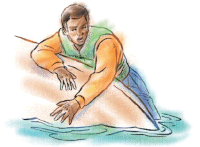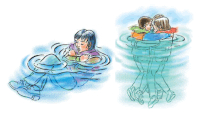What to do if you end up in the water.
Avoid Hypothermia
Fishing and hunting are activities that generally start early and end late in the boating season. Waters are usually cold during those periods, exposing you and other recreational boaters to hypothermia and cold shock.
Cold shock is probably responsible for more deaths than hypothermia. A sudden exposure to cold waters can instantly paralyze your muscles, leave you breathless, cause you to swallow water and suffocate you within moments of immersion. Should you survive the shock of the cold water, hypothermia is the next imminent danger.
Hypothermia is a drop of body temperature below normal (37°C) that results from a prolonged exposure to frigid waters. The signs and symptoms of the three different stages of hypothermia are:- First stage: shivering, reduced circulation;
- Second stage: slow, weak pulse, slowed breathing, lack of co-ordination, irritability, confusion and sleepy behavior;
- Advanced stage: slow, weak or absent respiration and pulse. The person may lose consciousness.
- Wear your personal flotation device (PFD) or lifejacket. This will help you to stay afloat and keep your head out of the water without wasting your energy;
- Swim only if you can join others or reach a safe shelter. Do not swim to keep yourself warm, this will only increase your loss of body heat;
- If possible, climb on top of a floating object (such as your craft) to keep as much of your body as possible out of the water. Frigid water will lower your body temperature faster than air (25 times faster);

Assume the fetal position, or if you are not alone, huddle together;

Remove the wet clothing of anyone who has fallen into the water and warm him or her with dry clothes.
Popular Misconception
Contrary to popular belief, alcohol does not warm you up but, rather, has the opposite effect. It is preferable to drink a warm, sugared, non-alcoholic drink that is free of caffeine.
Tip: Wear layered clothing under a windbreaker rather than one thick layer. Wool, even when wet, retains more heat than synthetics (polyester).
from: Avoiding Hypothermia